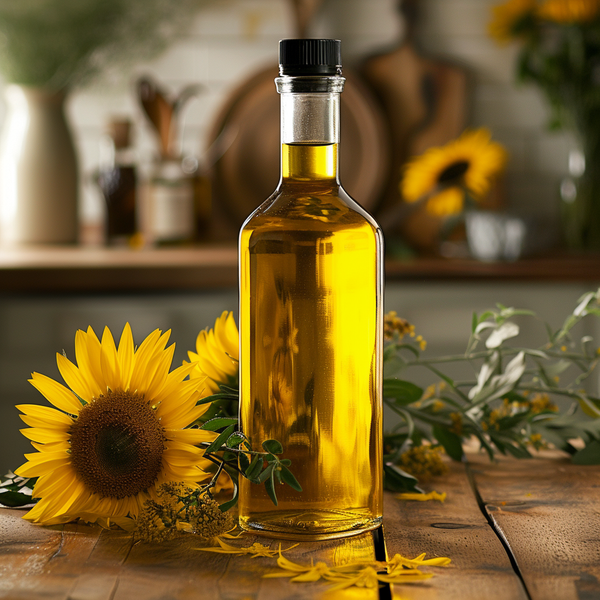
Sunflower Oil
Sunflower oil, extracted from the seeds of the sunflower plant, is a versatile and widely used cooking oil known for its light taste and high smoke point. It's rich in vitamin E and low in saturated fats, making it a popular choice for various culinary applications. Here's how sunflower oil is commonly used in cooking:
Frying:
Due to its high smoke point (ranging from 440°F to 475°F or 227°C to 246°C, depending on the refinement process), sunflower oil is ideal for frying foods. It can be used for deep-frying, pan-frying, and stir-frying, producing crispy and golden results without imparting a strong flavor to the food.
Salad Dressings:
The light, neutral flavor of sunflower oil makes it suitable for salad dressings and vinaigrettes. It can be combined with various vinegars, lemon juice, herbs, and spices to create flavorful dressings without overpowering the taste of the salad ingredients.
Baking:
Sunflower oil is often used in baking as a substitute for butter or other fats, providing moisture to cakes, muffins, and bread without adding a distinct flavor. Its liquid form allows for easy mixing and can contribute to a tender crumb in baked goods.
Sautéing and Stir-Frying:
The oil's high smoke point also makes it suitable for sautéing and stir-frying vegetables, meats, and other ingredients. It can withstand the high heat required for these cooking methods, ensuring that the food is cooked thoroughly without burning the oil.
Grilling:
Sunflower oil can be used to brush on meats, vegetables, and seafood before grilling to prevent sticking and to add moisture, helping to create a nice sear and grill marks.
Roasting:
Vegetables and meats can be coated with sunflower oil before roasting in the oven. The oil helps to brown the food and enhance its flavor while keeping it moist during the cooking process.
Marinades:
Its neutral taste makes sunflower oil an excellent base for marinades, as it carries the flavors of herbs, spices, and acidic components (like vinegar or citrus juice) well, without overwhelming the taste of the marinated food.
Preserving:
Sunflower oil can be used in preserving and making confits, where meats or vegetables are slowly cooked and preserved in oil. It provides a protective layer that helps to extend the shelf life of the preserved food.
Non-Cooking Uses:
Beyond cooking, sunflower oil is used as an ingredient in homemade mayonnaise and aioli, providing a smooth, creamy texture.
When using sunflower oil in cooking, it's important to choose the right type for your needs. Refined sunflower oil has a higher smoke point and is better suited for high-heat cooking methods, while unrefined (cold-pressed) sunflower oil has a lower smoke point and is better suited for salad dressings and low-heat cooking. Its health benefits, neutral flavor, and versatility make sunflower oil a popular choice in kitchens worldwide.
Nutritional Information
calories
884
carbohydrates
undefined g
fats
100 g
protein
undefined g